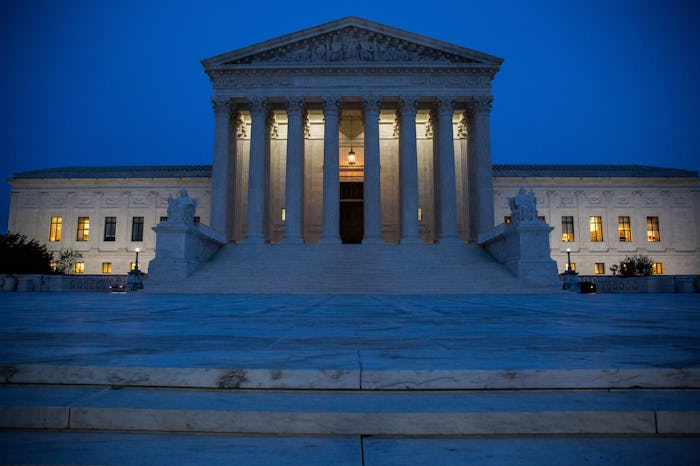News

Could The Supreme Court Overturn Roe V. Wade?
Ever the showman, President Donald Trump will announce during primetime — 8 p.m. Eastern Time — on Tuesday his nominee to fill the vacant seat on the Supreme Court. It's a monumental decision, one that could alter the quality of life and rights for so many Americans for a generation to come. Trump's presidency has already proved to be a threat to immigrants, refugees, the free press, access to health care, the environment, and more in just one week — and his looming pick will cement his intentions when it comes to women's reproductive freedom. There's no doubt that Trump wants to abolish abortion rights, but the real question is whether the Supreme Court could overturn Roe v. Wade.
In a 60 Minutes interview shortly after his unexpected election win in November, Trump told CBS' Lesley Stahl that the person he appoints to fill the vacancy left by the death of Justice Antonin Scalia in February "will be pro-life." Ideally, he said, the issue of abortion will lie with each state, a direct rebuke of the blanket protection Roe ensures in all 50 states. Essentially, the new president wants to turn back the clock on women's reproductive freedom more than 40 years — and by taking advantage of the the current empty seat (and possible future ones) on the Court, he could make real strides toward that goal.
If and when Trump's appointee to the Supreme Court makes it through the rigorous Senate confirmation process (Democrats are prepared to fight in retribution for Republicans' having blocked President Obama's original — and moderate — pick last year) the makeup of the highest court won't immediately shift to favor the obliteration of Roe. But three of the sitting justices on the bench are 78 or older, and they're all left-leaning when it comes to abortion. If another death or retirement gives Trump the opportunity to appoint a second conservative justice to the bench, a five-to-four coalition in favor of overturning the law could emerge.
And Trump is well on his way to forming that uncompromising alliance in the Supreme Court. The reported frontrunner for the position, Alabama Court of Appeals Judge William Pryor, once called Roe v. Wade "the worst abomination of constitutional law in our history." Sound familiar? Maybe that's because Vice President Mike Pence, another strident anti-abortion crusader, has a similar fate for the law in mind: He like to see it in "the ash heap of history where it belongs."
And Pence himself is a big proponent of the types of laws that aim to erode abortion access at the state level. While governor of his home state of Indiana, he championed legislation that would have required that aborted fetuses be either interred or cremated.
Aiming to prove the constitutionality of similar Targeted Restrictions on Abortion Providers, commonly referred to in pro-choice circles as TRAP laws, is likely how anti-abortion activists will pursue the eventual demise of Roe, Business Insider's Rebecca Harrington reported. For example, the Court struck down a Texas law that required Texas abortion providers to have admitting privileges at a hospital, as well as placed other restrictions on them, in June. If similar cases — like ones that involve implementing arbitrary cutoffs for when in her pregnancy a woman can have an abortion based on "fetal pain" — wind up before a more conservative court, the outcome will likely swing right.
Constitutional scholar and NAARL Pro-Choice American legal director Dawn Johnsen is particularly worried about the potential results of this gradual chipping away of women's right, as she told Harrington:
I am very pessimistic about it, and that's because I'm thinking about the range of ways Roe can fall that would not require the Supreme Court to actually say, "We are overruling Roe v. Wade." We've seen the kinds of laws that would shut clinics, and ban abortions for reasons, and force women to be interrogated by their doctors — and that all could be upheld without the Supreme Court actually saying, "We're overruling Roe v. Wade."
Another of Trump's lead contenders for the job is unlikely to challenge laws that would make it harder and harder for women to get the safe and legal reproductive health care they need. Federal Court of Appeals Judge Neil Gorsuch has backed employers seeking to limit inclusion of contraception in their workers' health coverage based on religious beliefs. Thomas Hardiman, another federal court of appeals judge, has not weighed in directly in an abortion-related case, although he's taken some conservative stances on issues like the right to bear arms, and is generally unswayed by demands for freedom of speech, according to SCOTUSblog. Pryor, Gorsuch, and Hardiman, are, of course, all middle-aged white men.
No matter what lies ahead for women's reproductive freedom, there is a long, long fight on the horizon for those who seek to defend it.